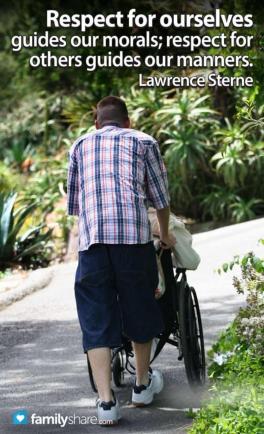
"Be sure to wear clean underwear in case you're in an accident."� Ah, who doesn't giggle at this quaint admonition of yore? "Respect your elders"� is another old-timey phrase that connotes a stern, wrinkled face and wagging finger. But as our world becomes continuously self-centered and lackadaisical, it seems more important than ever to encourage our youth to mind their manners and honor the older generations.
How can we help our young develop respect for their elders?
-
Teach the social niceties. I melt when I see one of my boys holding a door open for a lady. Or a man. Or a child or dog. Teaching children courteous gestures (giving up a seat in a crowded waiting room, allowing someone to step ahead in a line, writing a handwritten thank you note) trains them to be less selfish. Courtesy is cool, and kids will gain respect for themselves as they show respect for adults and all ages. British novelist Lawrence Sterne said, "Respect for ourselves guides our morals; respect for others guides our manners."�
-
Arrange for Grandma time. If your kids' grandparents or great-grandparents are available, encourage them to spend time together. Prompt your kids to learn from them, mind them, and love them. After some long-term exposure to their grandparents and lots of cringing from me, my kids finally learned to edit "crap"� and "shut up"� from their vocabulary. Their old-fashioned grandpa has sensitive ears. In addition to a wider vocabulary, most older folks have rich life experiences and wisdom to impart to our youngsters.
-
How do you do, Mr. Brady? When addressing adults, instruct your children to use titles. Unless she insists on "Kristy,"� encourage your child to call your friend "Mrs. Jenkins."� Using titles promotes a distinction between kids and adults, which is OK. When our family lived in the South, grown-ups were often addressed "Miss"� or "Mr."� before their first name, which I thought was a nice blend of casual and respectful. Also keep in mind that aunts and uncles are adults; teach your kids to say "Aunt Kelly"� or "Uncle Mark."�
-
Let your kids hang with trusted adults. The more they associate with their aunts, uncles, teachers, coaches and neighbors, the easier it is for kids to communicate with adults in general. When I was a kid I was nervous and intimidated around most grown-ups. I blushed, stammered, and wanted to disappear when certain teachers or adult neighbors talked to me. But as a teen, I grew more comfortable around older people after a church leader befriended me. One day she singled me out and invited me over for lunch. She was relaxed, funny and easy to confide in, and her example of a kind woman and hip young mom stayed with me.
-
Be a nice adult. I am no expert on how to befriend my children's peers. Sometimes I find myself tongue-tied around my teens' pals, which is ridiculous. I have to remind myself to relax and remember that I am the adult. Kids respect grown-ups they like, so it helps to be friendly, welcoming, and genuinely interested in their lives. High five your son's friend when he finishes his race. Blend fruit smoothies for your daughter's gang. Be likeable and supportive to your kids' peers; be someone they can look up to, trust and even lean on.
-
Pay a visit or shovel a driveway, kids in tow. I have a dear friend who is a very young 92-year-old. Anne is a hoot and I adore her. I deliver my frosted chocolate brownies and offer to clean her house (even though she refuses) with a kid or two in tow because I want them to learn about serving others. I don't help others nearly as often as I should, so I embrace those little opportunities to teach my kids how happy it makes me to help and serve people, especially the elderly.
"Children have never been very good at listening to their elders, but they have never failed to imitate them,"� said American writer James A. Baldwin. Of course, our kids learn about respect and manners from our examples. Being polite, smiling, serving, showing appreciation, obeying the law, and using good manners in general will go a long way in influencing our children's behavior toward their elders and people of all ages.

